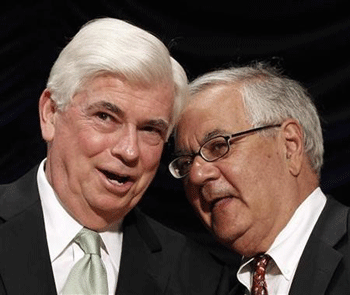A federal judge on Thursday dismissed a lawsuit that challenged the Dodd-Frank financial reform law Congress enacted after the credit crisis of 2008. Many critics of the law blame it for, among other things, reducing loan activity and drastically cutting free checking and other services at banks and credit unions.
And in a separate ruling, a different federal judge ordered the Federal Reserve to set sharply lower limits on debit card transaction fees that card issuers may charge retailers.
“Judge Ellen Huvelle ruled that community banks have not suffered legally redressable injuries from Dodd-Frank’s enshrinement of too-big-to-fail and thousands of pages of rules that cost dollars and man hours. We respectfully disagree, as does much of the American public, and will appeal,” said John Berlau, director of the Center for Investors & Entrepreneurs at the Competitive Enterprise Institute, in a statement in response to the dismissal.
Plaintiffs included State National Bank of Big Spring, Texas, the 60 Plus Association, and the Competitive Enterprise Institute, in addition to attorneys general in Michigan, Oklahoma, South Carolina and eight other states.
‘Very Real Harm’
“State National Bank of Big Spring is a community bank that has served its community for generations, and it is disturbing that the opinion — and the government — ignored the very real harm Dodd-Frank has inflicted on it and the customers who rely on the bank to provide loans for everything from their home to their small business,” said former White House Counsel C. Boyden Gray, lead counsel for the plaintiffs, in a statement. Gray had been White House Counsel to President George H.W. Bush from 1989 to 1993.
He said “Dodd-Frank’s complex new regulatory regime” has forced State National Bank and others to spend many thousands of dollars “simply to ensure that they are in compliance with the [Consumer Financial Protection Bureau’s] new policies. Furthermore, Dodd-Frank caused the bank to substantially change several of the services that it traditionally provided customers. Contrary to the government’s assertions, and the court’s opinion, these costs are not self-inflicted.”
Unrestrained, Unaccountable Power
Plaintiffs argued that Dodd-Frank gives an agency of unelected government bureaucrats unrestrained power.
“As a whole, Dodd-Frank aggregates the power of all three branches of government in one unelected, unsupervised and unaccountable bureaucrat,” said Gray when the lawsuit was filed last year.
For instance, Congress has no control over the CFPB’s budget, as funding comes directly from the Federal Reserve, which itself is independent of Congress. The CFPB board cannot outvote the director as commissioners in the Securities and Exchange Commission and other agencies can do. The law requires courts to give special deference to CFPB actions, severely limiting judicial review. And the president also cannot remove the CFPB director except under strictly limited circumstances as he can other administration officials, including Cabinet officials.
“If this decision stands, taxpayers and pension holders across the country will have no guarantee of being treated fairly or made whole in the event of a future financial crisis,” Gray said. “Instead, Dodd-Frank creates a ‘star chamber’ procedure that provides states and other creditors with no notice of impending bank ‘liquidations’ until after they have begun, after which Dodd-Frank denies the states meaningful judicial review to protect their rights and their financial investments — including the states’ pension funds.”
Debit Card Limits Ruling
That ruling came just one day after U.S. District Judge Richard Leon struck down debit card price controls in the Dodd-Frank financial overhaul as not draconian enough. He ruled the 21- to 26-cent fees the Federal Reserve established for banks to charge retailers were too high and implied seven to 12 cents would be required under Dodd-Frank’s “Durbin Amendment.”
Many Dodd-Frank critics say the debit card fee limits have benefitted big retailers by reducing their costs, which they have pocketed rather than reduce prices, and have drastically shrunk free checking and other formerly free or low-cost banking services.
The amendment is named for Sen. Dick Durbin (D-IL), who, in 2010, persuaded federal legislators to limit the fees debit card issuers could charge retailers per transaction. In 2011, the Fed set price caps on debit card interchange fees at 21 to 26 cents per transaction, a cut of approximately 50 percent. Debit card issuers have made up the loss by raising a host of banking fees and cutting programs such as free checking.





